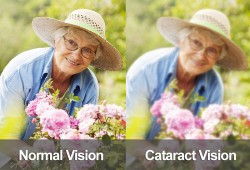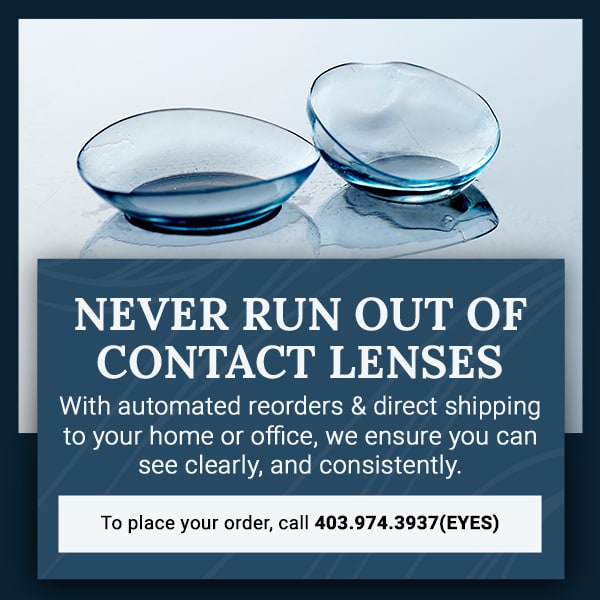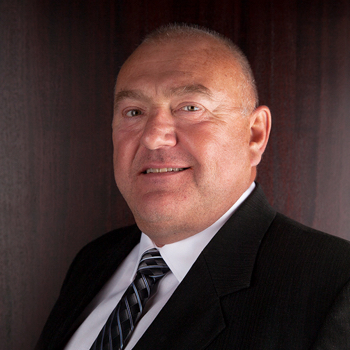By Dr. Andrew Hoover, OD
As we age, there are changes that should be expected. While not everyone will develop an age-related condition such as ARMD (age-related macular degeneration), everyone will eventually develop cataracts. We have seen visually significant cataracts in those under 50 years of age and we have seen people over 90 years of age without visually significant cataracts. Unofficially, mid-seventies is the typical age of referral for cataract surgery.
There are numerous types of cataracts, but in general, a cataract is when a crystal-clear lens loses transparency. Some people are born with cataracts, some people develop cataracts due to disease or medication, but the most common type of cataract is age-related. This is called nuclear sclerosis.
What are the risk factors?
Nuclear sclerosis cataracts are primarily caused by the aging process. Family history also seems to play a role in what age visually significant cataracts occur. These are factors that we cannot control. Fortunately, there are factors that we can control. UV exposure increases the rate of cataract development. Those who spend more time outside and have lived closer to the equator typically have more advanced cataracts than those further from the equator and less time outside. Fortunately, there is an easy fix. Everyone should be protecting their eyes from UV light, either with tinted sunglasses or clear spectacles with UV protection built in. This is why we try to educate parents to encourage children to wear sunglasses. Lifelong UV protection will lead to healthier eyes in our senior years. Smoking is another risk factor. Smoking is obviously associated with a number of more serious health issues and cataracts are another reason to quit smoking now.
When should I talk to my optometrist?

As an optometrist, it is a subjective decision when to discuss cataracts. You don’t wake up one day with visually significant cataracts, they develop slowly over time. In general, expect the discussion to begin in your 60’s. What we look for is a combination of your best corrected visual acuity and your reported visual symptoms. A class 5 driver’s license requires visual acuity of 20/50. We should start the process of cataract surgery before 20/50 is difficult to read as there will be a waiting period from the date of referral to the date of surgery. Besides a specific visual acuity, we also want to know how comfortable you are driving or working, especially at night. Some people’s visual function is more affected by early cataracts than others. If your ability to work or drive is adversely affected, it may be time for cataract surgery. One thing to keep in mind is that cataracts often develop slowly and therefore your own evaluation of the quality of your vision is not always reliable. We have often heard a patient report “perfect” vision and yet struggles to read the required eye chart line. This is an important reason for yearly exams, particularly for those 65 years of age and older.
What if I need cataract surgery?
After we have determined that cataract surgery is required, a referral letter will be written and set to the surgeon’s office. Within two weeks, you should be contacted with an appointment date for your initial consultation. If you have not heard back after two weeks, please contact our office. There are many great cataract surgeons in the city. Who we send you to will come down to physical location in the city, current wait times, your request, and our clinic’s history with the surgeon.
At your first appointment with the surgeon, confirmation of visually significant cataracts is made and overall ocular health is evaluated. While cataracts are a common cause of poor vision, there are other pathologies that contribute to poor visual function. Next, various measurements are taken and implant lens type will be discussed. In general, there are; single vision, basic intraocular lenses (IOL) that are covered by Alberta Health Care (AHC); single vision toric IOLs that may decrease reliance on glasses for distance; and multifocal IOLs that may decrease reliance on glasses for all distances. The toric and multifocal IOLs are premium lenses and are not covered by AHC. These premium lenses are not required and at times are not recommended. If you have questions about what has been discussed with the surgeon, you can always book an appointment with our clinic to clear up any questions you may have.
Is cataract surgery safe?
While it is normal to be worried about any surgery, cataract surgery is minimally invasive and quick. While there are always risks associated with any surgery, cataract surgery is safe and the risk of vision worsening without surgery is 100% as we age. Between follow-up appointments with the surgeon and our office, any complications should be found and addressed as needed.
What can I expect before and during cataract surgery?
Your surgeon will prescribe various drops to be used before and after surgery. This is to prevent infection and allow your eyes to heal quickly and with the best possible vision. It is critical that these drops are used exactly as prescribed. Often patients report that drops were not used the day of their appointment with us. This is not necessary. Please continue to use all drops as prescribed for as long as prescribed. If in doubt call our office or your surgeon’s office. Omega-3 supplementation prior to surgery has been shown to yield better results, both with regards to vision and ocular comfort. This will be discussed prior to your cataract surgery referral.
The procedure itself consists of removing your natural lens and implanting an artificial lens. Feel free to skip this paragraph if you are squeamish. Incisions are made to allow for tools to break up and remove your lens and to insert the new lens. In general, this is done with scalpel-like tools although lasers are being used as when in some cases. The bag the lens sits in will be cut open, the lenses will be broken up and these pieces will be removed. The flexible intraocular lens will then be placed in the bag behind the iris, tools are removed, and the procedure is complete. Please understand that this is a general idea of the procedure and your individual procedure may differ.
What happens after cataract surgery?
After your surgery, your surgeon will give you a schedule for follow-up care. Typically, this will be shared between our office and the surgeon’s office. While most patients leave with very good vision, this is not always the case. Surgery is a traumatic event and it does take time for the eye to heal up. Depending on the intraocular lens that was selected, the need for spectacle correction may include distance only, near only, multifocal correction, or over-the-counter spectacle correction. After cataract surgery, there will still be a need for routine, yearly care in addition to any specific care you may require. Any questions you may have can be answered by our office or your surgeon’s office.
If you have questions about cataracts, cataract surgery, or would like to book an appointment, please call our office at 403.974.3937 (EYES).




